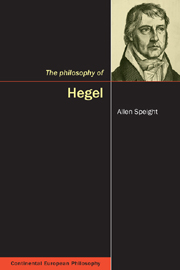Book contents
- Frontmatter
- Contents
- Acknowledgements
- Abbreviations
- Introduction
- 1 German Idealism and the young Hegel
- 2 The Phenomenology of Spirit
- 3 The Logic and Hegel's system
- 4 Ethics and politics
- 5 Hegel and the narrative task of history
- 6 Art, aesthetics and literary theory
- 7 Religion and philosophy
- Notes
- Guide to further reading
- Bibliography
- Index
5 - Hegel and the narrative task of history
- Frontmatter
- Contents
- Acknowledgements
- Abbreviations
- Introduction
- 1 German Idealism and the young Hegel
- 2 The Phenomenology of Spirit
- 3 The Logic and Hegel's system
- 4 Ethics and politics
- 5 Hegel and the narrative task of history
- 6 Art, aesthetics and literary theory
- 7 Religion and philosophy
- Notes
- Guide to further reading
- Bibliography
- Index
Summary
If there is anything for which Hegel is thought to be most philosophically guilty, it is for enmeshing philosophy more deeply than almost any of his predecessors in the problems and contingencies of history. We have seen in the preceding chapters the importance of history to Hegel's phenomenological and encyclopaedic projects in general, but we have noticed at the same time how contentiously the historical character of those projects is regarded. Thus, although almost all readers of the Phenomenology of Spirit acknowledge that the project is tied broadly – at least in its chapters on Spirit and Religion – to a narrative that traces the development of Western history and culture, there is no general consensus on the use Hegel makes of history either in those chapters or elsewhere in the Phenomenology. Likewise, we have seen that Hegel himself asserts that the moments of his Science of Logic correspond to actual shapes within the history of philosophy, beginning with the connection he draws between pure being and Eleatic monism.
Although he never published a book on history as a topic in itself, Hegel did lecture frequently on the topics of the philosophy of world history and the history of philosophy as a discipline. The lecture series on world history, particularly the introduction to those lectures (“Reason in History”, as it is titled in one of the most widely read English translations) is frequently taught in survey and introductory courses, and of all Hegel's works in English translation is often found by students to be among the most initially accessible.
- Type
- Chapter
- Information
- The Philosophy of Hegel , pp. 87 - 100Publisher: Acumen PublishingPrint publication year: 2008

